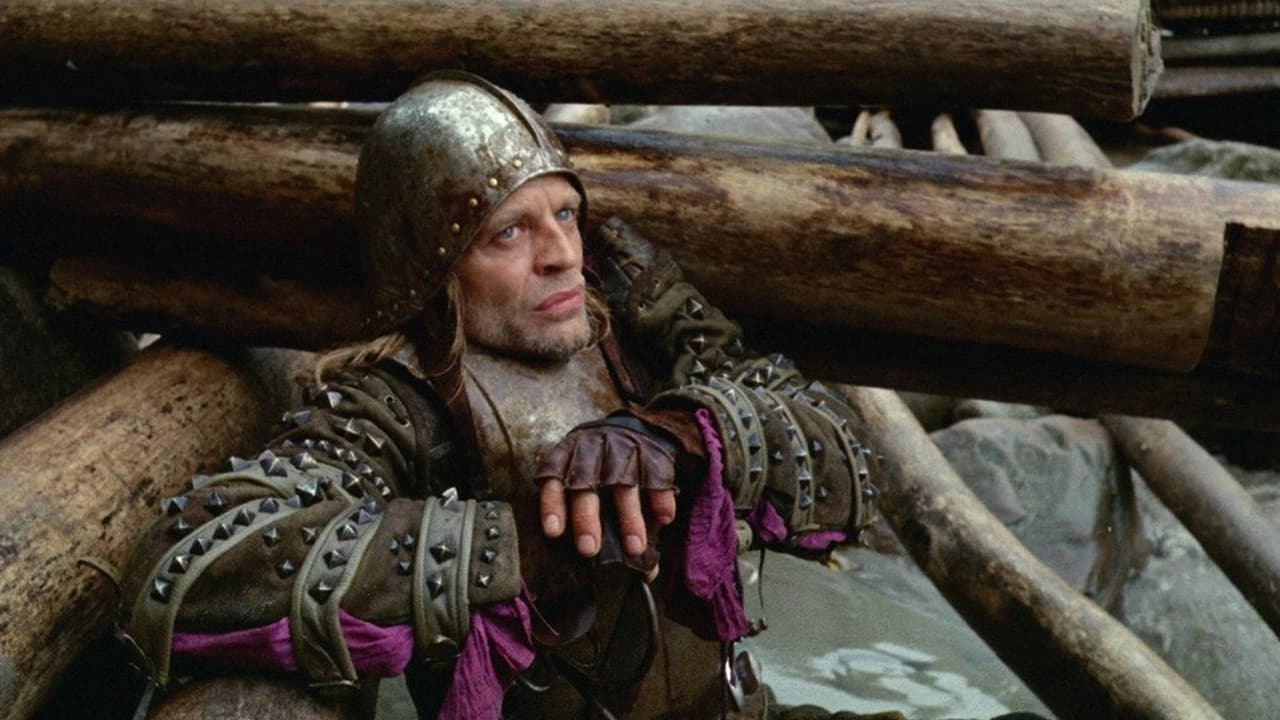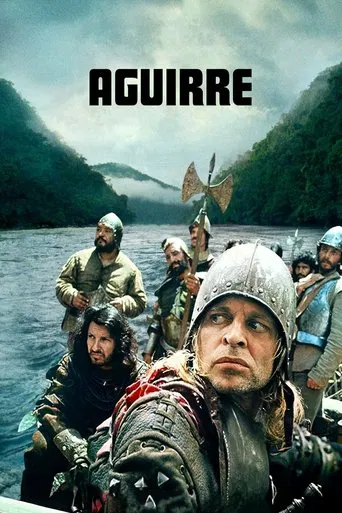

Klaus Kinski turns in a fantastic performance in this film, and his helmet and piercing blue eyes combine for an iconic image. He plays a power-hungry 16th century rebel who is hell-bent on finding the golden city of El Dorado to achieve riches and fame. I love how director Werner Herzog filmed on a location and really 'took us there', not only to the Amazon, but to a doomed feeling of hopelessness as the raft the Spaniards are on drifts downriver on a fool's errand. On the other hand, it's a bleak tale, and one in which little episodes such as natives approaching in a canoe and the Spaniards burning one of their villages are stitched together somewhat weakly, with jumps forward in time. The screenplay and editing seem disorganized, and while that may add to an overall dreamlike (or nightmarish), chaotic feeling, which was perhaps the point, it also made it a little less enjoyable for me. There are certainly some great images in the film, bookended by a caravan traveling through the mountains at the beginning, to Aguirre raving delusions of grandeur on a raft overrun with monkeys at the end. For me it's a good film, but not a great one.
... View MoreAguirre, the Wrath of GodBy the time technology makes exploring easy there's nothing left to discover.Which is why the adventurers in this drama didn't wait for Google Maps to exist.While on a Gonzalo Pizarro (Alejandro Repullés) lead expedition to find El Dorado, 16th century Spanish conquistador Lope de Aguirre (Klaus Kinski) is allocated to a small fleet sent down the Amazon river to scout ahead.Joining Aguirre on the raft is his daughter (Cecilia Rivera), his commander (Ruy Guerra), his commander's mistress (Helena Rojo), a nobleman and a priest.Aguirre's avarice eventually results in a mutiny. While his madness steers everyone aboard towards their deaths.German director Werner Herzog's disturbing depiction of colonialism, this cult classic uses fact on which to build its fictional account of Aguirre's descent into lunacy. Success is ultimately achieved thanks to Kinski's haunting performance.Incidentally, the only civilization the conquistadors are credited with discovering is crazy town.Yellow Lightvidiotreviews.blogspot.ca
... View MoreAnd really there is not much else to say. The power of vaunting ambition and personal magnetism in defiance of all reason. Seems like a highly apposite kind of film to watch in this era. "We will go on, we will persist, we will do this, we will make it happen against all possible reason."As regards the cinematography, yes it's kind of beautiful, yet it's also obviously realistic and plain and un-graded, not lush, not drenched in greenery or blue skies like you might expect from reviews mentioning how excellent it is. Do not expect Avatar style CGI because it ain't here. Herzog's Amazon is a world of brown mud and grey and very muted green.
... View MoreI was interested in seeing this movie upon seeing it appear in Roger Ebert's list of Top 10 favorites movies of all time. I think it might have been the only Foreign Language film on the list. Then again, I think "La Dolce Vita" might have been there too. I'll just say it's his pick for best foreign language film. And honestly? I think it's probably mine too. I'm normally not into Foreign Language films, but this is a breathtaking exception. The plot is quite basic, with a group of Spanish explorers searching for the legendary El Dorado.I am reminded of reading the book "War And Peace". It was great just to see the area being described, but it was the deep dialogue that really made it readable (is that a word?). The same works here. The camera work is among the best I have ever seen in a movie. I just love the way it shows people off in the distance and how it focuses on the most important things. Everything about this movie just looks beautiful. I love the costumes, I love the animals (who must be real), I love the environment, it's simply a gorgeous film. There is some action in it, but for the most part, they just have realistic stuff going on. The entire movie takes place outside and I don't think anyone is ever in a house.That's a wonderful and unique way to film. Even the very first scene had me hypnotized. It's beautiful to see these people being led along a mountain. Near the end of the movie, the title character Aguirre is told there is probably no golden city, but wants to conquer whatever he finds. Mixed throughout the film are insightful messages about politics and religion and the true motivations behind these ideals. It's one of the most philosophical movies I've seen in a long time. The title is spoken in a wonderful way as this is how Aguirre sees himself. The film never really ends, it just stops with little progress made in the entire story. It works wonderfully that way.What's great is just how amazingly realistic this film is. It shows how we crave glory and how we act around people of different races and beliefs. Everything just molds together for a wonderful visual feast. Near the end, we're not even sure of what's real. A guy is hit with an arrow, but it might just be in his (or someone else's) imagination. It is this delusion that makes us question exactly what goes on around us. After watching such horrible movies like, "They Saved Hitler's Brain", "Dracula Vs. Frankenstein", and "Doomsday Machine" this was an inspiring thing to watch. The only bad thing about this movie is that it's only a hour and a half! It seemed more worthy of being a truly epic film. Still, it works wonderful with its time and I obviously recommend it. ****
... View More